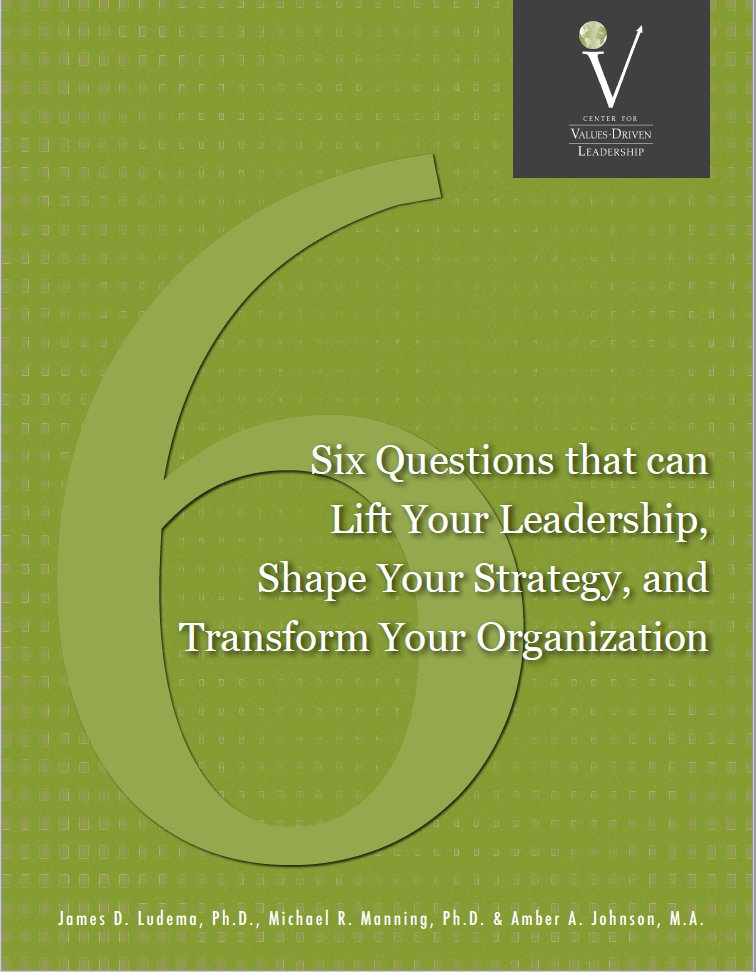You cannot get the answers you need if you ask the wrong questions.
It’s Monday morning and your calendar for the week is crammed with problems to solve and challenges to address. As a leader, your instinct may be to diagnose the situation by asking, “What’s wrong?” and then develop solutions from there.
But that might be the wrong approach. Why? Because when we try to figure out what went wrong, we spend time focusing on what is broken. That does not help us clarify what is working well; it does not point us toward a solution.
In this post, drawn from our recent eBook (which you can download for free at www.cvdl.org/sixquestions), we talk about the temptation to start with “What’s wrong?” and suggest an alternative question instead.
Sometimes it is important to recognize and directly address problems. It is foolish to pretend problems don’t exist. An Appreciative Inquiry (AI) process, however, helps organizations reframe problems so that they become an expression of a desired future. For example, imagine you work for a software company whose sales have tanked. Asking, “Why are sales so low?!?” is one way to address the problem. However, if you ask the questions below, you may find the answers point you much closer to actionable next steps to reach your sales goal.
“When our sales have been at their best, what made it possible?”
“What would it look like for us to be the world’s best high-volume sales team in the future?”
[su_box title=”What is Appreciative Inquiry?” style=”soft” box_color=”#95976C”]Appreciative Inquiry is a strengths-based, collaborative approach to leadership development and organizational change. Learn more at www.cvdl.org/ai. [/su_box]
Appreciative Inquiry invites you to create the future you want by building on the best of the past. In the process, problems are solved, challenges are met, risks are mitigated, and weaknesses are overcome by strengths. Not bad, huh?
Appreciative Inquiry draws from the fields of psychology, leadership, and organizational behavior to create a methodology that is nimble and effective. Let us illustrate with an example.
When Jim Ludema (one of the authors) was completing his Ph.D. at Case Western Reserve University, he was called in to help the oil industry company BP with their service stations, called BP Pro Care, they ran throughout Ohio at the time. A year before, the leaders at BP Pro Care completed a customer satisfaction survey, and the results were positive: 79% of customers were satisfied or highly satisfied. Pretty good, considering customers often receive bad news from their mechanic!
But 79% wasn’t enough, so BP Pro Care launched a study into the other 21%. They began to research customers who reported dissatisfaction with their service, and what they heard was predictable for anyone who has ever owned a car: the repairs took longer than expected, cost more than expected, didn’t solve the real problem. They also heard that the coffee in their lounge was terrible, the chairs were uncomfortable, and the cars were sometimes returned with dirty interiors.
Armed with that information, BP Pro Care began to warn its mechanics of what can go wrong. Months later, they conducted a second satisfaction survey to check their progress and found, to their surprise, that the bottom had dropped out of the satisfaction scores. Even more customers were dissatisfied with their service.
That’s when BP Pro Care called Jim and his colleagues. Using AI methodology, the consultants switched the questions and began to ask satisfied customers about the great service they received. Some of the answers were predictable – fast and affordable service, for example. Others were surprising: customers liked that the phone was answered quickly, that they could talk directly to their mechanic, and that the mechanic would call with an update, even if the work was not yet complete.
The leaders began to train on these customer service techniques. Mechanics became so quick to answer the phone that they were literally diving to pick up the receiver. They made more calls to customers; and they continued to provide fast and affordable service.
Within months, BP Pro Care’s satisfaction ratings had not just recovered, they went through the roof. They had 95% fully-satisfied customers within 8 months.
BP Pro Care found that when you ask the right questions, you get the results you want.
A 30-second Exercise to Test the Value of Asking Positive Questions
Take a second and ask yourself the following question:
Am I feeling tired today?
Most people, if asked that question, answer yes. And then their thoughts turn toward the feeling of being tired; they become aware of any sense of tiredness they feel, even though moments ago it hadn’t crossed their mind that they were tired.
Our minds move in the direction of the questions we ask. Now, imagine instead that you asked:
What makes me feel energized today?
Pausing to answer this question can reset your energy level, and help you tune in to what you really appreciate and value. This little exercise is a good reminder that the questions we ask shape not just the answers we receive, but our attitudes as well.
Learn more about Appreciative Inquiry
We acknowledge that it is important to understand the challenges and problems our organizations and leaders face. But if you want a successful future, your questions should point toward solutions rather than problems. Appreciative Inquiry, which is built around a series of adaptable questions, can help you reframe your challenges into business opportunities, and then identify new paths to reaching your goals.
We invite you to learn more about Appreciative Inquiry in two ways. First, download our free eBook, Six Questions that can Lift Your Leadership, Shape Your Strategy, and Transform Your Organization. Additionally, our new Certificate Series in Appreciative Leadership will help you develop mastery of AI skills. Learn more below.
[su_table]


